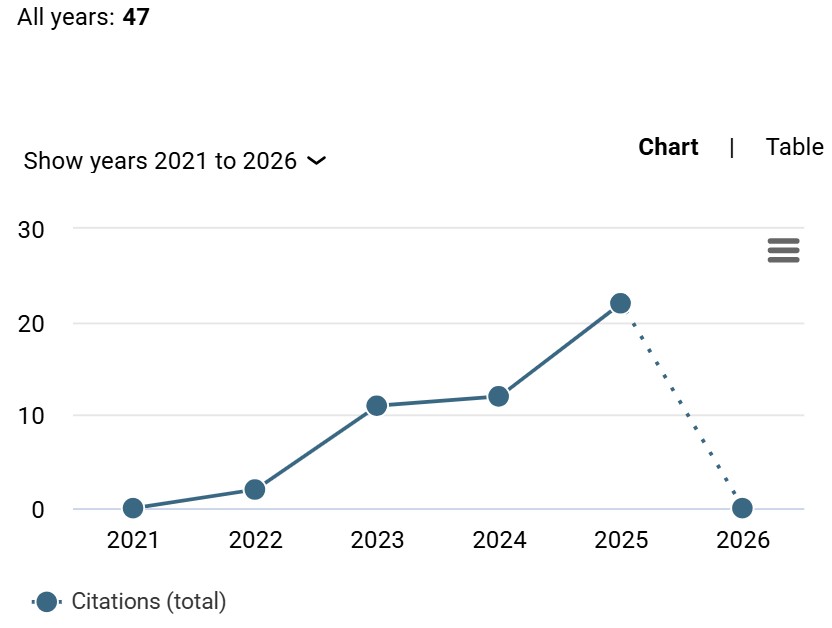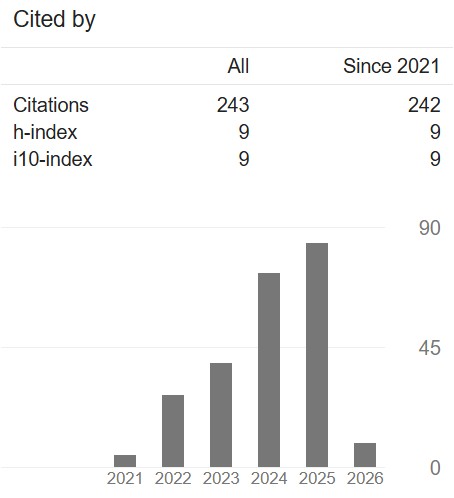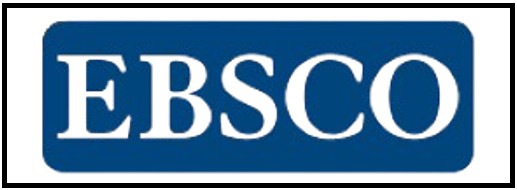Fluxes of carbon dioxide gases (CO2) in the mangrove soil of Passo Village, Ambon City
Abstract
Mangrove ecosystems play a significant role in carbon absorption. However, the accumulation of organic matter in mangrove sediments undergoes decomposition, which triggers the release of CO2 gas flux. This study aimed to analyze the CO2 gas flux in mangrove sediments of Negeri Passo, Ambon City. Gas data collection was performed using cylinder canopies at the three observation stations. Gas was passed through the syringe five times with an interval of 30s. Gas concentration analysis was carried out using the gas chromatography method, while CO2 flux was analyzed with flux equations referring to slope regression, volume and area of the scope, temperature, molecular weight of the gas, ideal gas settings, and time constants based on gas intake intervals. The results showed that the average CO2 concentration in St. 1 was 465.14 ± 96.52 ppm, and was the lowest compared to St. 2 and St. 3 with values of 638.60 ± 90.05 ppm and 630.98 ± 54.09 ppm, respectively. Meanwhile, the average CO2 flux was 50.44 mg/m2/hour. The largest CO2 gas flux was observed at St. 2 at 103.69 mg/m2/hour. Meanwhile, the lowest flux was found at St. 3, which was 16.24 mg/m2/hour. Based on this, it can be concluded that] the mangrove ecosystem in Negeri Passo has a higher concentration of CO2 gas than the average concentration of climate change stabilization scenarios. However, the CO2 flux was lower than that at other locations in the Ambon Dalam Bay area. In addition, the potential for significant carbon sequestration based on the Tier 1 model approach indicated that mangrove ecosystems in this location play an important role in climate change mitigation.
References
Alongi, D. M. (2014). Carbon cycling and storage in mangrove forests. Annual review of marine science, 6(1), 195-219. https://doi.org/10.1146/annurev-marine-010213-135020
Chauhan, R., Datta, A., Ramanathan, A. L., & Adhya, T. K. (2015). Factors influencing spatio-temporal variation of methane and nitrous oxide emission from a tropical mangrove of eastern coast of India. Atmospheric Environment, 107, 95-106. https://doi.org/10.1016/j.atmosenv.2015.02.006
Dhandi., Tuahatu, J.W., Pasanea, K., & Rahman. (2024). Concentration and emission of carbon dioxide (CO2) gas in mangrove sediments of Nania Village, Ambon City. Coastal and Ocean Journa, 8(1), 32-40. https://doi.org/10.29244/coj.v8i1.55723
Huxham, M., Kairu, A., Lang’at, J.A., Kivugo, R., Mwafrica, M., Huff, A., & Shilland, R. (2023). Rawls in the mangrove: Perceptions of justice in nature-based solutions projects. People and Nature. 1-16. https://doi.org/10.1002/pan3.10498
International Atomic Energy Agency. (1992). Manual on Measurement of Methane and Nitrous Oxide Emission from Agricultural. Vienna (AT), IAEA. pp 52-55.
Intergovernmental Panel on Climate Change. (2001). Climate Change 2001: The Scientific Basis. Cambridge (US), Cambridge University Pr. pp 128-134.
Kesaulya, I., Rahman., Haumahu, S., & Krisye. (2023). Global Warming Potential of Carbon dioxide and Methane Emission from Mangrove Sediment in Waiheru Coastal, Ambon Bay. In IOP Conference Series: Earth and Environmental Science (Vol. 1207, No. 1, p. 012030). IOP Publishing. https://doi.org/10.1088/1755-1315/1207/1/012030
Matsuno, T., Maruyama, K., & Tsutsui, J. (2012). Stabilization of atmospheric carbon dioxide via zero emissions—An alternative way to a stable global environment. Part 1: Examination of the traditional stabilization concept. Proceedings of the Japan Academy, Series B, 88(7), 368-384. https://doi.org/10.2183/pjab.88.368
Nazareth, D.R., & Gonsalves, M.J. (2022). Influence of seasonal and environmental variables on the emission of methane from the mangrove sediments of Goa. Environmental Monitoring Assessment, 194(4), 249. https://doi.org/10.1007/s10661-021-09734-3
Pietersz, J. H., Pribadi, R., Pentury, R., & Ario, R. (2024). Estimasi Tutupan Kanopi Berdasarkan NDVI dan Kondisi Tutupan Tajuk Pada Ekosistem Mangrove Negeri Passo, Teluk Ambon Dalam. Jurnal Kelautan Tropis, 27(2), 197-208. https://doi.org/10.14710/jkt.v27i2.22090
Rahman, R., Wardiatno, Y., Yulianda, F., Effendi, H., & Rusmana, I. (2018). Fluxes of greenhouse gases CO2, CH4 and N2O from mangrove soil in Tallo River, Makassar. Jurnal Biologi Tropis, 18(2), 149–158. https://doi.org/10.29303/jbt.v18i2.755
Rahman., Wardiatno, Y., Yulianda, F., Rusmana, I., & Bengen, D.G. (2020a). Metode dan Analisis Studi Ekosistem Mangrove. Bogor (ID): IPB Press. 124p.
Rahman., Wardiatno, Y., Yulianda, F., & Rusmana, I. (2020b). Seasonal fluxes of CO2 , CH4 and N2O greenhouse gases in various mangrove species on the coast of West Muna Regency, Southeast Sulawesi, Indonesia. Plant Archives, 20(2), 4301 – 4311.
Rahman, R., Wardiatno, Y., Yulianda, F., Lokollo, F. F., & Rusmana, I. (2023). Emissions and potential of global warming of N2O gas of mangrove litter degradation on the West Muna Regency Coast. Jurnal Ilmu Kehutanan, 17(2), 127-134. https://doi.org/10.22146/jik.v17i2.7009
Rahman., Lokollo, F.F., Manuputty, G.D., Hukubun, R.D., Krisye., Maryono., Wawo, M., & Wardiatno, Y. (2024a). A review on the biodiversity and conservation of mangrove ecosystems in Indonesia. Biodiversity and Conservation, 33(3), 875-903. https://doi.org/10.1007/s10531-023-02767-9
Rahman., Ceantury, A., Tuahatu, J.W., Lokollo, F.F., Supusepa, J., Hulopi, M., Permatahati, Y.I., Lewerissa, A., & Wardiatno Y. (2024b). Mangrove ecosystem in Southeast Asia region: mangrove extent, blue carbon potential and CO2 emission in 1996-2020. Science of the Total Environment, 915(3), 1-12. https://doi.org/10.1016/j.scitotenv.2024.170052
Rahman, R., Kesaulya, I., & Ikbal, L. (2024c). Emisi gas rumah kaca (CO2 dan CH4) pada kawasan mangrove Desa Poka, Kota Ambon. Journal of Environmental Sustainability Management, 8(2), 38-52. http://dx.doi.org/10.36813/jplb.8.1.38-52
Salamena, G. G., Whinney, J. C., Heron, S. F., & Ridd, P. V. (2022). Frontogenesis and estuarine circulation at the shallow sill of a tropical fjord: Insights from Ambon Bay, eastern Indonesia. Regional Studies in Marine Science, 56, 102696. https://doi.org/10.1016/j.rsma.2022.102696
Salamena, G. G., Heron, S. F., Ridd, P. V., & Whinney, J. C. (2023). A risk assessment of marine plastics in coastal waters of a small island: Lessons from Ambon Island, eastern Indonesia. Regional Studies in Marine Science, 65, 103086. https://doi.org/10.1016/j.rsma.2023.103086
Sidik, F., Lawrence, A., Wagey, T., Zamzani, F., & Lovelock, C. E. (2023). Blue carbon: A new paradigm of mangrove conservation and management in Indonesia. Marine Policy, 147, 105388. https://doi.org/10.1016/j.marpol.2022.105388
Copyright (c) 2024 Rahman Rahman, Eva Susan Ratuluhain, Fahrul Rozy Fakaubun, Imanuel Villian Trayanta Soukotta

This work is licensed under a Creative Commons Attribution-ShareAlike 4.0 International License.
Copyright on articles was retained by the respective author(s) without restrictions. The author grants the journal its first publication rights with the work simultaneously licensed under the Creative Commons Attribution-ShareAlike 4.0 International (CC BY-SA) license. This means anyone is free to copy, transform, or redistribute articles for any lawful purpose in any medium, provided they give appropriate attribution to the original author(s).
















